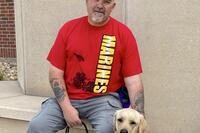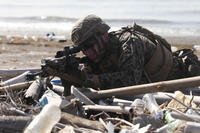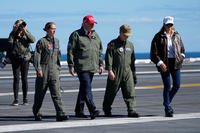Defense Secretary Mark Esper said Tuesday that the military will provide five million respiratory masks and 2,000 portable ventilators to the states in the fight against the novel coronavirus.
But he urged caution on the deployment of field hospitals, something suggested earlier by the White House.
At a Pentagon news conference, Esper outlined the medical and logistical support the Pentagon is prepared to offer, with the first priority being to make available to the states five million N95 surgical masks, which have been in short supply in some areas as the pandemic has escalated.
The first million masks from the Defense Department's strategic reserves will go out immediately, with the rest distributed in the coming days, he said.
In addition, the DoD will provide the Department of Health and Human Services with "up to 2,000 deployable ventilators" for distribution to the states as needed to cope with the expected surge in coronavirus patients and the predicted shortage of the devices in intensive-care units nationwide.
Esper cautioned that the deployable ventilators are different than those used in the civilian sector and will require training in their use by military personnel at local hospitals.
"Yes, these require some special training," he said.
Related: The Return of M*A*S*H: Army Corps on Standby to Build Tent Hospitals, White House Says
Fourteen military labs will be made available to process coronavirus tests for the states, he added. "We hope this provides excess capacity to the civilian population."
Esper also said that mobilization of the Army Corps of Engineers to renovate empty buildings would probably not be the best and quickest way to expand the capacity of local hospitals to deal with a surge of COVID-19 patients requiring isolation rooms.
The Corps of Engineers could provide oversight of renovation projects, he said, but its mission is not to do the work itself. Instead, it contracts out for projects with private construction companies, and renovating buildings might be accomplished faster on the local level, he said.
Air Force Gen. John Hyten, vice chairman of the Joint Chiefs of Staff, and Deputy Defense Secretary David Norquist are his main contacts with the White House task force on coronavirus, Esper said, and more consultation with them might be necessary before decisions are made.
He said field hospitals and the doctors who staff them deal with combat trauma. "They don't necessarily have the segregated space" to deal with coronavirus patients needing isolation, he added.
However, the field hospitals could "take the pressure off civilian hospitals" by taking on their trauma cases to open up space for the treatment of coronavirus, Esper said.
Overall, the military doesn't want to be put in the position of "robbing Peter to pay Paul," he said.
The doctors and nurses to staff the tent hospitals would be drawn from the Reserves and possibly be taken away from their civilian jobs, in which they might already be working to ease the coronavirus crisis, he said.
"We have to be very conscious of that," Esper said. "As I've talked to a couple of governors today, we talked about that, and I think people are beginning to understand what that trade-off means."
The same considerations must be taken into account on the deployment of the hospital ships USNS Comfort on the East Coast and USNS Mercy on the West Coast, he said.
The Comfort, which recently deployed to South America, is currently undergoing maintenance at its home station in Norfolk, Virginia. The Mercy, whose home station is San Diego, is deployable but would have to be staffed first with doctors and nurses drawn from the civilian sector, Esper said.
He said the DoD is prepared to do all it can in the fight against coronavirus, but added that the active-duty military should be considered a "last resort" in providing resources and personnel.
Esper said he had not monitored the earlier White House news conference at which President Donald Trump and Vice President Mike Pence discussed preparations underway for the deployment of DoD tent hospitals and the Army Corps of Engineers, but said the pluses and minuses should be weighed first.
"I'm more than willing to send the Corps of Engineers out to work with states. If we can be useful, if we can help, we're certainly willing to provide that service," Esper said.
But it might be quicker to have the states and localities contract for building renovations, he said.
-- Richard Sisk can be reached at Richard.Sisk@Military.com.
Read more: More COVID-19 coverage






























